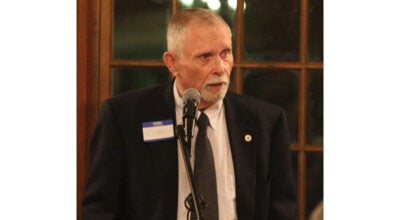If you can’t preach like Paul
Published 6:57 pm Monday, May 18, 2020
|
Getting your Trinity Audio player ready...
|
By Charles Qualls
We’ve been there. Well, at least we’ve been to the place that Christian tradition holds to have been … the place. We can never be certain with ancient biblical sites. Except that in this case, I believe there is a good reason we can have some confidence. In 2016, just months before we moved to Franklin, Elizabeth and I stood in the place where the apostle Paul spoke in Acts 17: 22-31. He had been called to appear in front of the Areopagus in ancient Athens.
For one reason, we have confidence because local tradition says that Mars Hill is where the Aereopagus met back then. It was just atop a small rock hill, kind of a miniature Stone Mountain for those of you who have been. Not far from the local Forum, a staple of Roman-era business and leadership. A second reason I believe this is the location is that when one is up on the top of Mars Hill, you can see a spectacular backdrop that would have fit perfectly with Paul’s message here in Acts 17.
The Acropolis of ancient Athens is right next to Mars Hill. In the Hellenistic world, each major city had an acropolis. That was usually the highest point or nearby hill. There, prominent temples were built so that the city could come and worship the Greek gods.
Hanging in a dramatic panorama behind him, as he addressed the Areopagus, Paul may have gestured up toward the great Parthenon and perhaps another dozen sanctuaries and temples all around it. These venues were committed to the worship of various Greek gods. Apparently, he had noticed that one of them even carried an inscription “To an unknown god.” His invitation to speak before the Areopagus was probably less about him being in trouble and more about him being new in town. They would simply ask someone to audition or explain themselves before they allowed the stranger to join the normal public discourse.
Athenians in the Hellenistic period enjoyed public debates. Almost like a sport or a favorite pastime, they loved for people to stand and wax eloquent about new ideas. Then, the discussion would begin. As one observer has said, like a cat toying with a mouse so were the Athenians with ideas and opinions. Now, Paul pointed toward that miscellaneous temple on the hilltop behind him, dedicated to an unknown god. Skillfully, he used the dramatic backdrop of the Acropolis and declared that he had come to tell them about that previously “unknown god.”
How does your story of faith contribute to the public awareness of our God? Oh, I’d like for us all to be articulate about our faith when the appropriate times come. But I am far more interested in how our daily living tells the story of our faith for us. For “In him we live and move and have our being,” we hear Paul tell the council in Acts 17. Here’s the surprising thing. Not too many people were persuaded by him about the faith there in Athens. As skillful a preacher as he was, he didn’t win over philosophic Athenians.
Paul left, after a brief stay there, pretty beaten up emotionally. He retreated to live and heal among the Corinthians immediately afterward.
No, most of the Athenians were not exactly won over by his testimony or “case for Christ.” However, some few were left changed by the way he lived. Maybe somewhat by what he had said. They ended up forming a church at Athens, and the faith eventually grew there after he left. But that’s a story for another day.
May the God of our days help us even in today’s COVID-driven, relative isolation. May God give us the grace to live and move as though the very being of Christ resides within us. May God help us to look and act more like Jesus. That is our very best testimony. It is our most powerful sermon.
The REV. DR. CHARLES QUALLS is the pastor of Franklin Baptist Church. Contact him at 562-5135.





